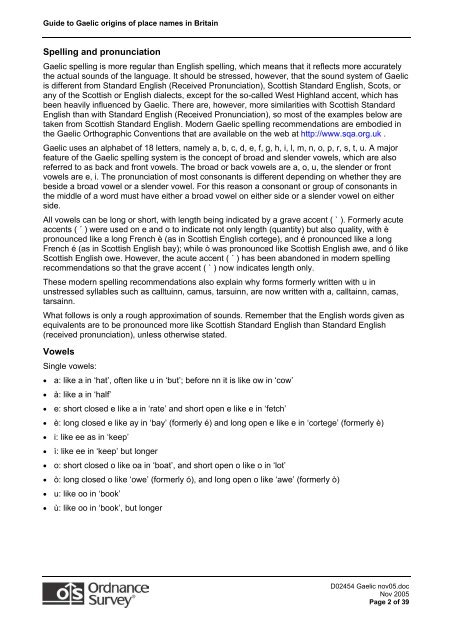guide-to-gaelic-origins-of-place-names
guide-to-gaelic-origins-of-place-names
guide-to-gaelic-origins-of-place-names
Create successful ePaper yourself
Turn your PDF publications into a flip-book with our unique Google optimized e-Paper software.
Guide <strong>to</strong> Gaelic <strong>origins</strong> <strong>of</strong> <strong>place</strong> <strong>names</strong> in Britain<br />
Spelling and pronunciation<br />
Gaelic spelling is more regular than English spelling, which means that it reflects more accurately<br />
the actual sounds <strong>of</strong> the language. It should be stressed, however, that the sound system <strong>of</strong> Gaelic<br />
is different from Standard English (Received Pronunciation), Scottish Standard English, Scots, or<br />
any <strong>of</strong> the Scottish or English dialects, except for the so-called West Highland accent, which has<br />
been heavily influenced by Gaelic. There are, however, more similarities with Scottish Standard<br />
English than with Standard English (Received Pronunciation), so most <strong>of</strong> the examples below are<br />
taken from Scottish Standard English. Modern Gaelic spelling recommendations are embodied in<br />
the Gaelic Orthographic Conventions that are available on the web at http://www.sqa.org.uk .<br />
Gaelic uses an alphabet <strong>of</strong> 18 letters, namely a, b, c, d, e, f, g, h, i, l, m, n, o, p, r, s, t, u. A major<br />
feature <strong>of</strong> the Gaelic spelling system is the concept <strong>of</strong> broad and slender vowels, which are also<br />
referred <strong>to</strong> as back and front vowels. The broad or back vowels are a, o, u, the slender or front<br />
vowels are e, i. The pronunciation <strong>of</strong> most consonants is different depending on whether they are<br />
beside a broad vowel or a slender vowel. For this reason a consonant or group <strong>of</strong> consonants in<br />
the middle <strong>of</strong> a word must have either a broad vowel on either side or a slender vowel on either<br />
side.<br />
All vowels can be long or short, with length being indicated by a grave accent ( ` ). Formerly acute<br />
accents ( ´ ) were used on e and o <strong>to</strong> indicate not only length (quantity) but also quality, with è<br />
pronounced like a long French è (as in Scottish English cortege), and é pronounced like a long<br />
French é (as in Scottish English bay); while ò was pronounced like Scottish English awe, and ó like<br />
Scottish English owe. However, the acute accent ( ´ ) has been abandoned in modern spelling<br />
recommendations so that the grave accent ( ` ) now indicates length only.<br />
These modern spelling recommendations also explain why forms formerly written with u in<br />
unstressed syllables such as calltuinn, camus, tarsuinn, are now written with a, calltainn, camas,<br />
tarsainn.<br />
What follows is only a rough approximation <strong>of</strong> sounds. Remember that the English words given as<br />
equivalents are <strong>to</strong> be pronounced more like Scottish Standard English than Standard English<br />
(received pronunciation), unless otherwise stated.<br />
Vowels<br />
Single vowels:<br />
• a: like a in ‘hat’, <strong>of</strong>ten like u in ‘but’; before nn it is like ow in ‘cow’<br />
• à: like a in ‘half’<br />
• e: short closed e like a in ‘rate’ and short open e like e in ‘fetch’<br />
• è: long closed e like ay in ‘bay’ (formerly é) and long open e like e in ‘cortege’ (formerly è)<br />
• i: like ee as in ‘keep’<br />
• ì: like ee in ‘keep’ but longer<br />
• o: short closed o like oa in ‘boat’, and short open o like o in ‘lot’<br />
• ò: long closed o like ‘owe’ (formerly ó), and long open o like ‘awe’ (formerly ò)<br />
• u: like oo in ‘book’<br />
• ù: like oo in ‘book’, but longer<br />
D02454 Gaelic nov05.doc<br />
Nov 2005<br />
Page 2 <strong>of</strong> 39


